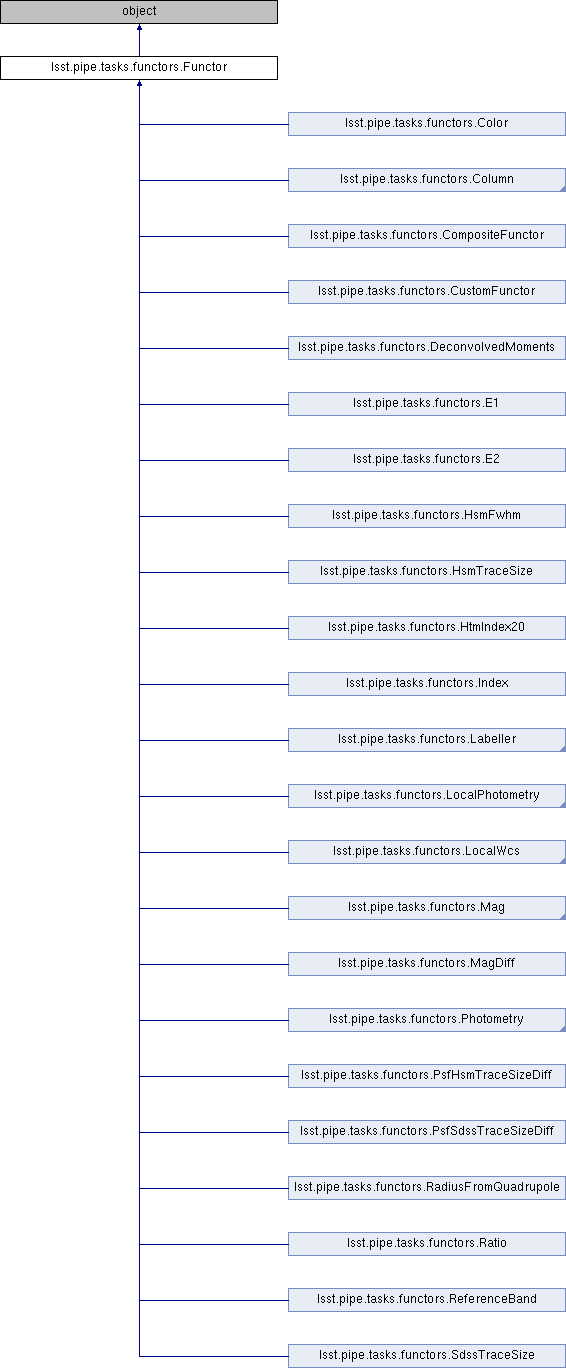
Public Member Functions | |
| def | __init__ (self, filt=None, dataset=None, noDup=None) |
| def | noDup (self) |
| def | columns (self) |
| def | multilevelColumns (self, data, columnIndex=None, returnTuple=False) |
| def | __call__ (self, data, dropna=False) |
| def | difference (self, data1, data2, **kwargs) |
| def | fail (self, df) |
| def | name (self) |
| def | shortname (self) |
Public Attributes | |
| filt | |
| dataset | |
Detailed Description
Define and execute a calculation on a ParquetTable
The `__call__` method accepts either a `ParquetTable` object or a
`DeferredDatasetHandle`, and returns the
result of the calculation as a single column. Each functor defines what
columns are needed for the calculation, and only these columns are read
from the `ParquetTable`.
The action of `__call__` consists of two steps: first, loading the
necessary columns from disk into memory as a `pandas.DataFrame` object;
and second, performing the computation on this dataframe and returning the
result.
To define a new `Functor`, a subclass must define a `_func` method,
that takes a `pandas.DataFrame` and returns result in a `pandas.Series`.
In addition, it must define the following attributes
* `_columns`: The columns necessary to perform the calculation
* `name`: A name appropriate for a figure axis label
* `shortname`: A name appropriate for use as a dictionary key
On initialization, a `Functor` should declare what band (`filt` kwarg)
and dataset (e.g. `'ref'`, `'meas'`, `'forced_src'`) it is intended to be
applied to. This enables the `_get_data` method to extract the proper
columns from the parquet file. If not specified, the dataset will fall back
on the `_defaultDataset`attribute. If band is not specified and `dataset`
is anything other than `'ref'`, then an error will be raised when trying to
perform the calculation.
Originally, `Functor` was set up to expect
datasets formatted like the `deepCoadd_obj` dataset; that is, a
dataframe with a multi-level column index, with the levels of the
column index being `band`, `dataset`, and `column`.
It has since been generalized to apply to dataframes without mutli-level
indices and multi-level indices with just `dataset` and `column` levels.
In addition, the `_get_data` method that reads
the dataframe from the `ParquetTable` will return a dataframe with column
index levels defined by the `_dfLevels` attribute; by default, this is
`column`.
The `_dfLevels` attributes should generally not need to
be changed, unless `_func` needs columns from multiple filters or datasets
to do the calculation.
An example of this is the `lsst.pipe.tasks.functors.Color` functor, for
which `_dfLevels = ('band', 'column')`, and `_func` expects the dataframe
it gets to have those levels in the column index.
Parameters
----------
filt : str
Filter upon which to do the calculation
dataset : str
Dataset upon which to do the calculation
(e.g., 'ref', 'meas', 'forced_src').
Definition at line 78 of file functors.py.
Constructor & Destructor Documentation
◆ __init__()
| def lsst.pipe.tasks.functors.Functor.__init__ | ( | self, | |
filt = None, |
|||
dataset = None, |
|||
noDup = None |
|||
| ) |
Definition at line 142 of file functors.py.
Member Function Documentation
◆ __call__()
| def lsst.pipe.tasks.functors.Functor.__call__ | ( | self, | |
| data, | |||
dropna = False |
|||
| ) |
Definition at line 340 of file functors.py.
◆ columns()
| def lsst.pipe.tasks.functors.Functor.columns | ( | self | ) |
Columns required to perform calculation
Reimplemented in lsst.pipe.tasks.functors.Ratio, lsst.pipe.tasks.functors.LocalDipoleDiffFluxErr, lsst.pipe.tasks.functors.LocalDipoleDiffFlux, lsst.pipe.tasks.functors.LocalDipoleMeanFluxErr, lsst.pipe.tasks.functors.LocalDipoleMeanFlux, lsst.pipe.tasks.functors.LocalMagnitudeErr, lsst.pipe.tasks.functors.LocalMagnitude, lsst.pipe.tasks.functors.LocalNanojanskyErr, lsst.pipe.tasks.functors.LocalNanojansky, lsst.pipe.tasks.functors.MagnitudeErr, lsst.pipe.tasks.functors.NanoJanskyErr, lsst.pipe.tasks.functors.Photometry, lsst.pipe.tasks.functors.ReferenceBand, lsst.pipe.tasks.functors.ConvertPixelSqToArcsecondsSq, lsst.pipe.tasks.functors.ConvertPixelToArcseconds, lsst.pipe.tasks.functors.ComputePixelScale, lsst.pipe.tasks.functors.RadiusFromQuadrupole, lsst.pipe.tasks.functors.E2, lsst.pipe.tasks.functors.E1, lsst.pipe.tasks.functors.Color, lsst.pipe.tasks.functors.MagDiff, lsst.pipe.tasks.functors.MagErr, lsst.pipe.tasks.functors.Mag, lsst.pipe.tasks.functors.Column, lsst.pipe.tasks.functors.CustomFunctor, and lsst.pipe.tasks.functors.CompositeFunctor.
Definition at line 155 of file functors.py.
◆ difference()
| def lsst.pipe.tasks.functors.Functor.difference | ( | self, | |
| data1, | |||
| data2, | |||
| ** | kwargs | ||
| ) |
Computes difference between functor called on two different ParquetTable objects
Definition at line 351 of file functors.py.
◆ fail()
| def lsst.pipe.tasks.functors.Functor.fail | ( | self, | |
| df | |||
| ) |
Definition at line 356 of file functors.py.
◆ multilevelColumns()
| def lsst.pipe.tasks.functors.Functor.multilevelColumns | ( | self, | |
| data, | |||
columnIndex = None, |
|||
returnTuple = False |
|||
| ) |
Returns columns needed by functor from multilevel dataset
To access tables with multilevel column structure, the `MultilevelParquetTable`
or `DeferredDatasetHandle` need to be passed either a list of tuples or a
dictionary.
Parameters
----------
data : `MultilevelParquetTable` or `DeferredDatasetHandle`
columnIndex (optional): pandas `Index` object
either passed or read in from `DeferredDatasetHandle`.
`returnTuple` : bool
If true, then return a list of tuples rather than the column dictionary
specification. This is set to `True` by `CompositeFunctor` in order to be able to
combine columns from the various component functors.
Definition at line 229 of file functors.py.
◆ name()
| def lsst.pipe.tasks.functors.Functor.name | ( | self | ) |
Full name of functor (suitable for figure labels)
Reimplemented in lsst.pipe.tasks.functors.Ratio, lsst.pipe.tasks.functors.LocalDipoleDiffFluxErr, lsst.pipe.tasks.functors.LocalDipoleDiffFlux, lsst.pipe.tasks.functors.LocalDipoleMeanFluxErr, lsst.pipe.tasks.functors.LocalDipoleMeanFlux, lsst.pipe.tasks.functors.LocalMagnitudeErr, lsst.pipe.tasks.functors.LocalMagnitude, lsst.pipe.tasks.functors.LocalNanojanskyErr, lsst.pipe.tasks.functors.LocalNanojansky, lsst.pipe.tasks.functors.Photometry, lsst.pipe.tasks.functors.ConvertPixelSqToArcsecondsSq, lsst.pipe.tasks.functors.ConvertPixelToArcseconds, lsst.pipe.tasks.functors.Color, lsst.pipe.tasks.functors.MagDiff, lsst.pipe.tasks.functors.MagErr, lsst.pipe.tasks.functors.Mag, lsst.pipe.tasks.functors.Column, and lsst.pipe.tasks.functors.CustomFunctor.
Definition at line 360 of file functors.py.
◆ noDup()
| def lsst.pipe.tasks.functors.Functor.noDup | ( | self | ) |
Definition at line 148 of file functors.py.
◆ shortname()
| def lsst.pipe.tasks.functors.Functor.shortname | ( | self | ) |
Short name of functor (suitable for column name/dict key)
Reimplemented in lsst.pipe.tasks.functors.Color, and lsst.pipe.tasks.functors.MagDiff.
Definition at line 366 of file functors.py.
Member Data Documentation
◆ dataset
| lsst.pipe.tasks.functors.Functor.dataset |
Definition at line 144 of file functors.py.
◆ filt
| lsst.pipe.tasks.functors.Functor.filt |
Definition at line 143 of file functors.py.
The documentation for this class was generated from the following file:
- /j/snowflake/release/lsstsw/stack/lsst-scipipe-0.7.0/Linux64/pipe_tasks/21.0.0-172-gfb10e10a+18fedfabac/python/lsst/pipe/tasks/functors.py